Hachioji Matsuri Festival 八王子まつり
|
|
|

The Hachioji Matsuri is Hachioji's biggest event of the year. Held during the first weekend (Fri-Sun.) of Aug., it is basically a festival of ornate floats paraded around the main streets near JR Hachioji Station.
|
|
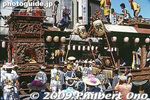
From the Edo Period, the festival was originally held by two local shrines, the Hachiman Yakumo Shrine and Taga Shrine. Both shrines are still involved, but today the festival is more of a community event organized by a large group of local organizations.
|
|
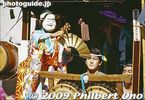
I went on the second day years ago, and on the third day on Aug. 9, 2009. The second day features a parade of the 19 floats. The festival attracted over 600,000 people during the three days in Aug. 2009.
|
|
|
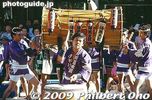
The second day also has a taiko drumming contest for the Kanto region.
|
|

Taiko drummer at Hachioji Matsuri. She was very good.
|
|

Taiko drummer at Hachioji Matsuri.
|
|
|
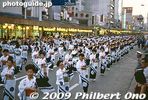
In the evening on the second day of Hachioji Matsuri is a large folk dance parade called Minyo Nagashi during 4 pm to 6 pm. 民踊流し
|
|
|
|
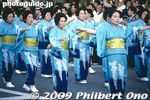
Minyo Nagashi folk dancing at Hachioji Matsuri, Tokyo.
|
|

JR Hachioji Station is decorated with Hachioji Matsuri paper lanterns. The station also had a festival information booth where you could obtain free festival maps/pamphlets and information (in Jaoanese).
|
|

JR Hachioji Station is a very busy train station.
|
|

Near the train station is this diagonal road called "Yu Road" leading to the Koshu Kaido (Route 20) main road where the festival is held.
|
|

Yu Road is a shopping road.
|
|

A float procession is ready to walk down Yu Road at 5 pm.
|
|

There are 19 floats (dashi). Nine of them belong to the Shimo-chiku area of Hachiman Yakumo Shrine in the east part of the city. And ten of them are from the west part (Kami-chiku) under Taga Shrine.
|
|

Earlier during the third day, they had Shishimai lion dances by this pair of lions displayed here.
|
|

On the Koshu Kaido main road, they started a mikoshi (portable shrine) procession from 5 pm on the third day.
|
|

Mikoshi bearers
|
|

All-female mikoshi bearers.
|
|

This float had a group of tekomai women, Hachioji Matsuri.
|
|

Tekomai at Hachioji Matsuri, Tokyo.
|
|

During the Edo Period, the floats originally had dolls. But since the late Meiji Period, the floats have become sculptured wooden floats. Eight of the floats were lost during World War II, but they were rebuilt. So some of them look quite new.
|
|

The floats have a masked person dancing as a fox, etc. They are messengers of the gods.
|
|

Koshu Kaido is filled with people during the mikoshi procession.
|
|
|
|
|

A girl twirling a decorative pole.
|
|

She was doing it to music. Hachioji Matsuri.
|
|
|
|
|

Flute players
|
|
|
|
|
|

Then at 6 pm, they held a "buttsuke" meeting between a few floats which performed at an intersection. This was at the Yokoyama-tsuji intersection. ぶっつけ
|
|

After the buttsuke meeting, the floats disband into the street.
|
|
|

Women in yukata watching the Hachioji Matsuri.
|
|

Sometimes two floats would meet up again and perform together.
|
|

They pulled the floats up and down the main road.
|
|

One traditional float featuring dolls.
|
|

Tekomai
|
|
|

Pulling a float at Hachioji Matsuri.
|
|
|
|
|

One float had a group of geisha-like musicians.
|
|

Geisha-like musicians, playing the samisen.
|
|
|

Now this is the Kami-chiku (上地区) section of Koshu Kaido where more floats were being paraded. However, I noticed that there were fewer people here. It's further away from the train station.
|
|

Two floats in Kami-chiku.
|
|
|

There are always people riding on the roof of the floats.
|
|
|
|

Shishimai lion dance, Hachioji Matsuri.
|
|
|
|
|
|

White fox
|
|

Back to the more crowded Shimo-chiku was a meeting of nine floats at 7:45 pm. They were together for 30 min. 山車年番送り 札の辻
|
|

Very crowded at Hachioji Matsuri.
|
|
|
|
|

Finally, the floats disbanded as they left one by one.
|
|
|

Another float procession.
|
|
|

Coming down on Yu Road.
|
|
|
|
|
|

My YouTube video of the Hachioji Matsuri in 2009.
|
|

Poster for Hachioji Matsuri in 2009.
|
|
|
|